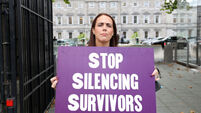RTÉ journalist gets email threatening her 'not to solicit negative comments about men' on radio show

RTÉ journalist, Katie Hannon. File Picture
RTÉ journalist Katie Hannon received a threatening email in the lead-up to her weekly radio show, telling her not to "solicit negative comments about men" during the programme, and stating that she would have to "personally answer for it" if she did so.
The anonymous email was sent to Ms Hannon personally shortly before her show aired earlier this afternoon.













